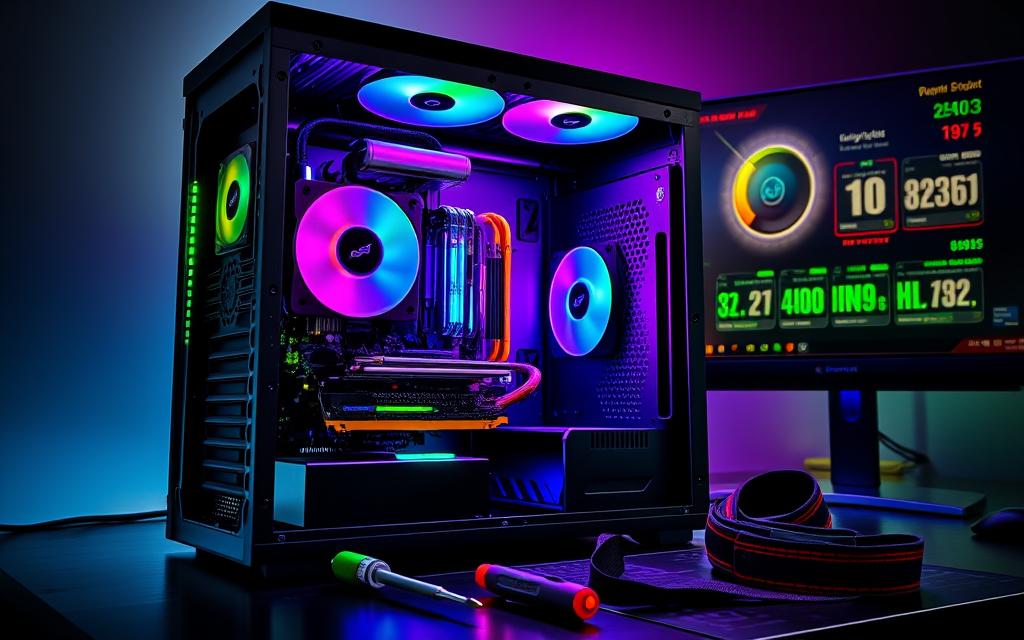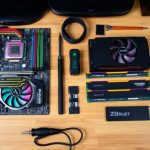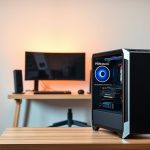Transform Your PC into a Gaming Powerhouse: Step-by-Step
Ordinary computers can become extraordinary gaming machines. Upgrading your PC is an investment in performance and personalisation. It’s also a way to boost your gaming excitement.
Building your own system can save you up to 30% compared to pre-configured machines. By choosing components wisely, you’ll create a powerful rig without overspending.
Modern gaming requires at least 16GB of RAM for smooth gameplay. Strategic upgrades can extend your PC’s lifespan by 3-5 years.
Start by understanding your current system’s potential. Often, targeted upgrades can revitalise an aging machine.
Each component plays a crucial role in your gaming experience. From graphics cards to storage, every part matters.
This guide will help you select components and understand performance metrics. You’ll create a gaming PC that matches your style and gaming goals.
Understanding the Core Components of a Gaming PC
A powerful gaming PC relies on carefully selected hardware components. These components work together seamlessly, directly impacting overall performance and gaming experience.
The heart of any gaming system lies in its gaming PC components. Modern gamers must consider multiple factors when assembling their ideal gaming machine.
https://www.youtube.com/watch?v=7hQAvPfNGmU
Selecting the right hardware involves understanding critical performance benchmarks. It also requires knowledge of system requirements for optimal gaming performance.
Essential Hardware Requirements
When building a gaming PC, several key components demand attention:
- Processor (CPU): The computational engine of your system
- Graphics Card (GPU): Crucial for rendering game visuals
- Random Access Memory (RAM): Supports smooth multitasking
- Storage Solutions: Determines game loading speeds
Performance Benchmarks for Gaming
Performance benchmarks offer vital insights into gaming capabilities. Modern games require robust hardware to deliver smooth experiences.
| Component | Minimum Specification | Recommended Specification |
|---|---|---|
| CPU Cores | 4 Cores | 6-8 Cores |
| RAM | 8 GB | 16-32 GB |
| GPU | Entry-level Graphics Card | RTX 30/40 Series |
| Storage | 256 GB SSD | 512 GB-1 TB NVMe SSD |
Power Supply Considerations
A reliable power supply unit (PSU) ensures system stability. Experts suggest allowing 200-250 watts of headroom for future upgrades.
“The GPU is the beating heart of your gaming PC, directly determining game performance.”
Gamers should aim for balanced hardware investments. Each component plays a crucial role in creating an exceptional gaming experience.
How to Upgrade a PC to a Gaming PC
Turning a standard PC into a gaming powerhouse needs careful planning. It involves key steps to boost your computer’s performance. This process can dramatically enhance your gaming experience.

First, assess your current system’s capabilities. This helps identify precise upgrade needs. Knowing your existing hardware is crucial for successful upgrades.
“A strategic approach to PC upgrades can unlock remarkable gaming potential without breaking the bank.”
- Evaluate current system specifications
- Identify performance bottlenecks
- Research compatible hardware components
- Budget for strategic upgrades
Key hardware installation priorities typically include:
| Component | Upgrade Impact | Performance Improvement |
|---|---|---|
| Graphics Card | High | 50-100% frame rate increase |
| RAM | Medium | 50-70% multitasking performance |
| SSD | High | 300-600% data transfer speeds |
Savvy gamers know that strategic component upgrades can greatly improve gaming experiences. Careful selection and installation can revitalise an ageing system. This approach avoids the need for a complete rebuild.
- Prioritise graphics card upgrades
- Consider RAM expansion to 32GB
- Replace HDD with NVMe SSD
- Ensure adequate power supply
Successful gaming PC conversion requires patience and research. A systematic approach to hardware installation is crucial. With these steps, you’ll soon enjoy enhanced gaming performance.
Selecting the Perfect Graphics Card for Your Build
A top-notch graphics card can turn your PC into a gaming beast. Understanding GPU performance tiers and new technologies is key to making the right choice.
These upgrades can vastly improve your gaming experience. It’s worth taking the time to select wisely.
Modern gaming needs advanced graphics abilities. The latest GPU tiers offer great performance at different price points.
- Entry-level: Ideal for casual gaming and 1080p performance
- Mid-range: Excellent for competitive gaming and high refresh rates
- High-end: Designed for 4K gaming and content creation
GPU Performance Tiers Explained
Graphics card performance varies greatly across price ranges. Nvidia’s RTX 40-series and AMD’s RX 7000-series are current market leaders.
These GPUs provide exceptional gaming capabilities. They offer a range of options for different budgets and needs.
| Performance Tier | Price Range | Recommended GPU | Typical Performance |
|---|---|---|---|
| Budget | Under £300 | RTX 3060 TI | 1080p, 60-90 FPS |
| Mainstream | £300-£700 | RTX 4070 | 1440p, 90-144 FPS |
| High-End | £700-£1,500 | RTX 4080 | 4K, 144+ FPS |
Ray Tracing and DLSS Capabilities
Ray tracing technology creates stunning visual realism in games. Nvidia’s DLSS boosts performance by cleverly upscaling game resolutions.
This tech now supports over 440 games. It’s a game-changer for immersive gameplay.
Invest approximately 40% of your PC budget in a graphics card for optimal gaming performance.
Compatibility Checks
Before buying, check these key compatibility factors:
- Motherboard PCIe slot version
- Power supply wattage
- Physical case dimensions
- Processor compatibility
Memory and Storage Solutions for Optimal Gaming
Strategic memory and storage solutions are vital for an amazing gaming experience. Gaming RAM ensures smooth, responsive gameplay, keeping players fully immersed in virtual worlds.
Storage optimisation is crucial for peak performance in modern gaming. The SSD vs HDD debate continues to shape computer storage approaches.
Solid-state drives offer incredibly fast load times. They reduce waiting periods and keep gamers engaged in the action.
Performance isn’t just about raw power—it’s about intelligent resource management.
- Minimum 16GB RAM recommended for serious gaming
- Combine SSD and HDD for optimal storage strategy
- NVMe SSDs provide exceptional read/write speeds
Kingston Technology showcases modern storage solutions with SSDs up to 4TB. These drives can slash boot times from 30-40 seconds to just 10-13 seconds.
| Storage Type | Boot Time | Read Speed |
|---|---|---|
| Traditional HDD | 30-40 seconds | Up to 160 MB/s |
| PCIe NVMe SSD | 10-13 seconds | Up to 7,300 MB/s |
Pro tip: Choose high-performance components that balance cost and capability. Upgrading from 8GB to 16GB RAM can boost multitasking performance by 30%.
Advanced Cooling Solutions and Case Modifications
Proper cooling is vital for your gaming PC’s peak performance. Modern PC cooling solutions offer gamers exceptional thermal management capabilities. These advancements help maintain system reliability and performance.
Stock CPU coolers often struggle with high-performance processors. Gaming enthusiasts know that effective cooling is crucial. Upgrading your cooling system can significantly improve your PC’s performance.
Airflow Optimisation Techniques
Mastering airflow optimisation requires strategic planning. Consider these essential strategies:
- Install at least one intake and one exhaust fan
- Utilise larger 120mm or 140mm fans for quieter operation
- Maintain more intake fans than exhaust fans for optimal dust management
Thermal Management Strategies
Advanced thermal management goes beyond basic cooling. Undervolting and careful component selection can reduce heat generation. These strategies improve overall system efficiency.
Effective cooling can reduce CPU temperatures by 10-15 degrees Celsius, transforming your gaming experience.
Case Selection Guidelines
Choosing the right case is crucial for optimal PC cooling. Look for cases with:
- Multiple fan mounting points
- Good cable management options
- Proper ventilation design
Implementing these cooling solutions and airflow techniques will boost your gaming rig’s performance. Your PC will run cooler and more efficiently, enhancing your gaming experience.
Conclusion
Building a custom gaming rig is about crafting a personalised performance machine. It goes beyond simple hardware replacements. Strategic investments can transform average systems into high-powered gaming powerhouses.
Performance improvement is a tangible reality. Targeted upgrades can deliver remarkable results. A CPU upgrade from an i7 7700k to an i9 12900k can boost frame rates by 113%.
GPU enhancements can push resolution capabilities to 4K with 80+ fps. This shows the potential of a well-planned custom gaming rig.
The journey doesn’t end with initial assembly. Continuous learning and driver updates remain crucial. Strategic component selection is also important.
Upgrades might cost over £3,200, but the returns are immeasurable. For passionate gamers, this is an investment in their digital playground.
Embrace the evolution of your gaming setup. With research and strategic upgrades, your rig will push boundaries. It will deliver extraordinary gaming experiences.
FAQ
How much does it cost to upgrade a PC for gaming?
Upgrading a PC for gaming can cost between £300 and £1,500. The price depends on your current system and desired performance. Graphics cards and processors are the main factors affecting cost.
Can I upgrade my existing PC for gaming, or do I need to build a new one?
Upgrading an existing PC is often possible and more cost-effective. You can replace key components like the graphics card and add more RAM. Installing a solid-state drive (SSD) can also boost performance.
What is the most important component for gaming performance?
The graphics card (GPU) is crucial for gaming performance. It determines how well you can run modern games. Higher resolutions, frame rates, and graphical settings rely on a good GPU.
Do I need liquid cooling for my gaming PC?
Liquid cooling isn’t always necessary for gaming PCs. High-quality air cooling can be just as effective for most setups. Your choice depends on your performance needs and budget.
How much RAM do I need for gaming?
For modern gaming, we suggest at least 16GB of RAM. However, 32GB offers better performance for demanding games and multitasking. More RAM can improve your gaming experience significantly.
Can I use my existing power supply when upgrading?
Your existing power supply may not be sufficient for new components. High-performance graphics cards and processors often need more power. Check the power requirements of new parts before upgrading.
What is ray tracing, and do I need it?
Ray tracing creates more realistic lighting and reflections in games. It’s a premium feature for those seeking top-notch visuals. However, it’s not essential for enjoying most games.
How often should I upgrade my gaming PC?
Major component upgrades are typically recommended every 3-4 years. You can extend this by upgrading individual parts like the GPU or RAM. Regular updates keep your system running smoothly.
What’s the difference between SSD and HDD for gaming?
Solid-state drives (SSDs) offer much faster load times than hard disk drives (HDDs). SSDs can dramatically reduce game loading times and boost overall system performance. They’re a great upgrade for gaming PCs.
Do I need special knowledge to upgrade my PC?
Basic computer literacy and research can help you upgrade your gaming PC. Many upgrades are straightforward with online tutorials and guides. With care and patience, most people can successfully upgrade their PC.










